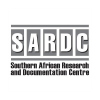Monitoring hydrological changes from space in a sparse gauged basin
Africa is endowed with abundant freshwater resources. It has sufficient rainfall and relatively low levels of water withdrawals for three major uses: domestic, agricultural and industrial uses. Changes in Africa’s water resources has been noticed transpiring in changes in water flow and variability, falling groundwater levels, changes in rainfall levels and timing, strongly influenced under climate change. The continent has a huge potential for energy production through hydropower.










